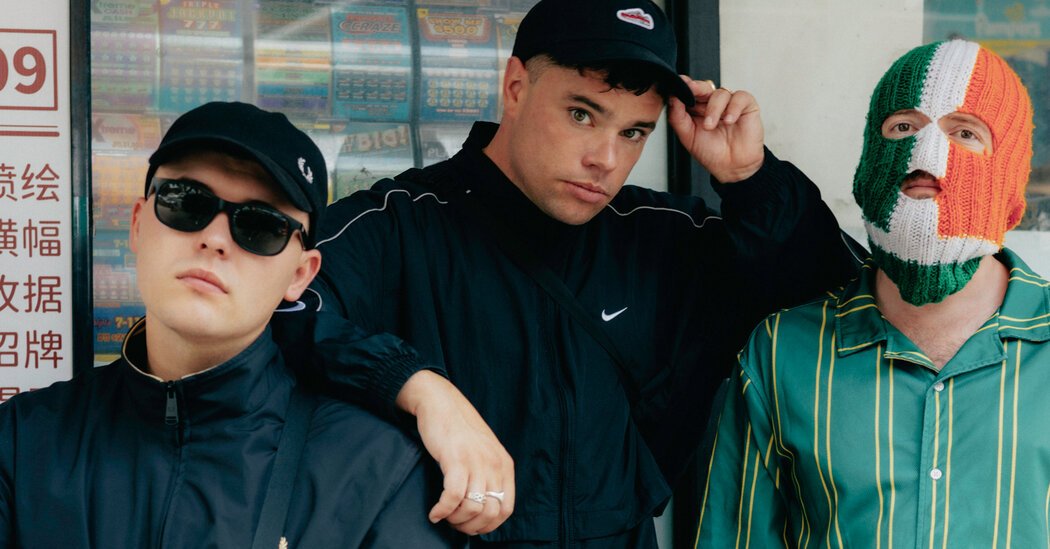“He gave me his wallet,” joked D.J. Próvaí, a member of the Belfast-based rap trio Kneecap, to explain why the group trusted the British filmmaker Rich Peppiatt to tell their story.
Kneecap’s blending of hip-hop beats with Irish-language rap lyrics championing republican politics — seeking unity for the Ireland’s north and south — has won it fans on both sides of Ireland’s internal border. The group has also drawn wrath from both British and Northern Irish politicians, who have accused it of inciting sectarianism. But this only made the trio a more attractive subject for his first scripted project, Peppiatt said, and “Kneecap” — a riotous fictionalized retelling of the rappers’ origins — comes to U.S. theaters Friday.
“They deal with serious subjects in a hysterical way and made headlines for saying things that no one else seemed to be saying,” Peppiatt said in an interview alongside two group members. Last year, Kneecap unveiled a cartoonlike mural in Belfast of a police vehicle on fire, accompanied by an anti-police message in Irish.
“They also played the media very well, drawing fire from the media and politicians, but always turning it to their own advantage,” Peppiatt added.
A former journalist, Peppiatt resigned from the British tabloid newspaper The Daily Star in 2011 and then made the documentary “One Rogue Reporter” about unscrupulous newspaper editors. In the Kneecap lads, he found kindred rebellious spirits, and they were reassured by Peppiatt’s own turbulent experience with the news media.
After first meeting with the trio, Peppiatt decided to learn Irish. The language is central to the latest iteration of a so-called Celtic revival, in which artists — including Kneecap — have interrogated Irish identity and culture. The dominance of the English language in Ireland is a legacy of British colonization, and “the fact that we spent day to day speaking a language that was almost driven out of existence is a political act,” Mo Chara, a Kneecap member, said in a phone interview.
Even with Peppiatt’s commitment to speak the same language, the Kneecap team was initially hesitant about having their lives and work turned into a movie, and had turned down inquiries from documentary-makers before. There was the risk a film would be cheesy, Mo Chara said, and could negatively impact Kneecap’s career.
But in 2019, when Peppiatt proposed a narrative feature in which the trio would play fictionalized versions of themselves, they were intrigued. Two years later, Peppiatt directed the music video for the Kneecap track “Guilty Conscience,” shot inside an empty church, as something of a creative test.
The director passed. “Rich was serious about this and not just using our story for his own benefit,” said Móglaí Bap, whose onscreen father is played by the Irish actor Michael Fassbender.
To craft the screenplay for the film, Peppiatt and Kneecap met in pubs, where its members would share stories from their upbringings and reminisce about the group’s early days. For the most part, the wildest tales onscreen are the closest to reality: Móglaí Bap’s christening did take place at a sacred Catholic site as a British Army helicopter hovered overhead, and there the trio did once search for their supply of LSD inside a trash can.
“You need an outsider to pick through the garbage that is their life and try and find something of value,” Peppiatt said, making the others in the room burst into laughter.
Danny Boyle’s drug-fueled “Trainspotting” was a consistent reference during production, but for aesthetic inspiration, Peppiatt also looked to “Amélie,” Jean-Pierre Jeunet’s whimsical romance.
“I thought, ‘I’m going to get my shot at making a film and I want it to feel stylistically distinct like ‘Amélie,’” Peppiatt said. “I want to make those bold choices.”
Once a week for about six months, the Kneecap trio had a session with the acting coach Kieran Lagan to become more comfortable in front of the camera. Their transition into acting was made easier by the film leaning into the humor that has characterized their onstage personas.
“In Ireland, we’ve always used comedy as a way of dealing with trauma,” Móglaí Bap said. “There’s nothing a good joke can’t help.”
D.J. Próvaí — whose name is pronounced “Provie,” like the common term for the Provisional Irish Republican Army, and who wears a balaclava in the colors of the Irish flag — said he knew people expect irony from Kneecap, but that they might be surprised at the film’s more emotional scenes. “Using our mother tongue as a method of communication brings in that femininity to the film,” he said.
When “Kneecap” premiered at the Sundance Film Festival in January, the British newspaper The Daily Mail ran an article expressing outrage that the production had received some public funding, noting that the band had “been accused of glorifying the I.R.A.”
When the film is released in Britain in late August, the musicians expect their critics — in the press and the British Parliament — to once again call them anti-British, but they are used to this tactic, and the attention it brings.
“It’s like those places where they have the wee fish that eat the dead skin off your feet,” D.J. Próvaí said. “The politicians eat the skin off our toes and we’re getting clean feet.”
Read More: These Irish Rappers Know Their Movie Will Make People Angry


